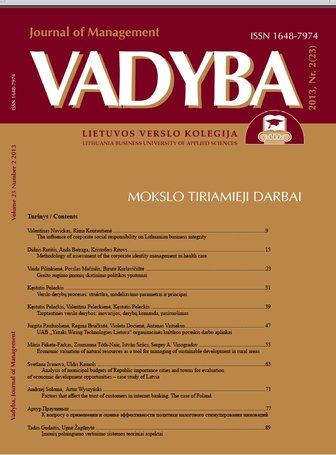TARPTAUTIŠKUMO DIMENSIJA REGIONINAME UNIVERSITETE: IŠŠŪKIAI JUNGTINĖS STUDIJŲ PROGRAMOS RENGĖJAMS
AN INTERNATIONAL DIMENSION IN A REGIONAL UNIVERSITY: CHALLENGING ISSUES FOR JOINT PROGRAMME DEVELOPERS
Author(s): Jūratė Valuckienė, Aina Būdvytytė-GudienėSubject(s): Economy
Published by: Lietuvos verslo kolegija
Keywords: Internationalization; higher education; joint study program.
Summary/Abstract: Today‘s society is characterised by openness, globalisation, availability of the state-of-the-art technologies, ongoing creation of new knowledge and its pragmatic application. Rapidly developing integration and globalisation processes evidence that the individual needs more global competency and international skills to be able to function in unfamiliar environments. Gürüz (2008) maintains that a global character of socio-economic development of societies during the past two decades has resulted in a new agenda for higher education. Institutions of higher education have been actively seeking ways of addressing the issues of entrepreneurship training, lifelong learning, cross-cultural education, effective development of innovative goods and services that will enhance the well-being of the global community. Therefore academic research and studies have shifted their focus from internal processes, objectives, ambitions to activities in the global context. The paper attempts to provide answers to the following problematic questions: What are the features of an international dimension in higher education? How an international dimension should be evaluated at an institutional level? What opportunities and capacities a regional university has to strengthen its international dimension? What challenging issues are developers of a joint programme, run by a regional university, facing? The aim of research presented in this paper is to identify challenges running a joint programme. The following methods have been applied: content analysis of relevant scientific sources and academic regulations for a regional university and joint programmes. Drawing on research on internationalisation in higher education (Knight 2008; Gürüz; 2008; Taylor, 2010; Virgilaitė-Mečkauskaitė, 2010 et al.), the authors of the paper have taken a conceptual approach that internationalisation in higher education is a response to globalisation processes. It is a strategy for higher education institutions that sets out how they prepared to perform their functions in the knowledge-driven economy the main features of which are the dimensions of all-inclusive internationalisation and globalisation that cover all activities of the institution, its mission, strategic goals, functions, etc. An international dimension in a higher education institution covers such activities as international cooperation and development initiatives, inter-institutional agreements, opening and management of university branch campuses abroad, curriculum development for internationalisation and its implementation, extra-curriculum activities, academic mobility, expertise, guidance, research activities abroad, recruitment of foreign students, student exchange programmes, joint and double degree programmes.
Journal: VADYBA
- Issue Year: 23/2013
- Issue No: 2
- Page Range: 123-132
- Page Count: 9
- Language: Lithuanian

